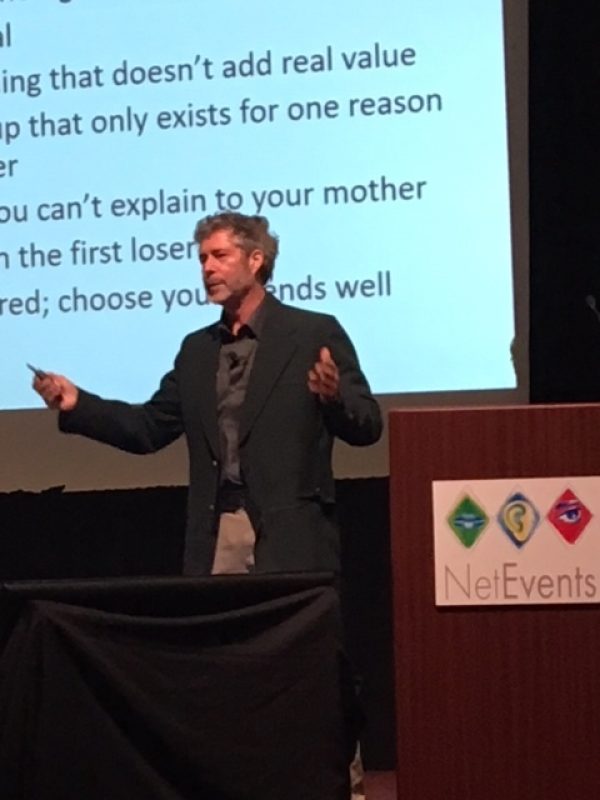How David Cheriton Beats Everyone at Tech Investing

SAN JOSE, Calif. -- David Cheriton, a Stanford University computer science professor, has a ridiculous track record as an early investor and founder of many startups, which have included Granite Systems (acquired by Cisco in 1996), Google (GOOGL), VMware (VMW), Arista Networks (ANET), and most recently Apstra (private). He wrote personal checks to these companies at the founding stage and has made billions of dollars by being one of the first guys in the door. How did he do it?
In a keynote here at the NetEvents conference, Cheriton attributed his success to two things: 1) Luck: Being a professor at Stanford and having the fortune to meet many brilliant people, 2) Focus: Being able to focus on very specific problems in an area in which he had expertise so that he could contribute to the companies in which he invested.
“I’d rather be lucky than smart and I think I have been pretty lucky,” said Cheriton.
Modest, to be sure. But luck was only part of the equation.

The patterns of Cheriton's enormous success did revolve around key connections with the people he met at Stanford. After meeting Andy Bechtolsheim, one of the founders of Sun Microsystems at Stanford, Cheriton and Bechtolsheim worked out an idea about how to make a better networking switch, which became Granite Systems. Cisco Systems Inc. acquired Granite in 1996 for $220 million (which now seems like a bargain). Cheriton said the technology revolutionized the multi-billion dollar Ethernet switching market by reducing the functionality of Ethernet switching down to a single chip.
Cheriton was just getting started on enormously successful technology bets. In 1996, the same year Granite was sold, Cherition ran into a Stanford Ph.D. student named Sergey Brin while roller-blading on the fourth floor of the Stanford Computer Science building. Cheriton was convinced that Google was the best search engine. He now had some money from Granite so he helped raise Google's first seed round, the investors in which included himself and Bechtolsheim.
On to VMware, which revolutionized cloud computing by enabling servers to be virtualized and privately shared by many users. Cheriton liked the VMware opportunity because he saw virtualizing operating systems as one of the holy grails of distributed computing. He met VMware co-founder Mendel Rosenblum at Stanford and he windsurfed with Rosenblum's wife, Diane Greene, who was also a founder as well as the early CEO of VMware.
In addition to the luck of running into other brilliant computer scientists around Stanford, Cheriton's other unique approach is to focus on a handful of specific startups in which he has expertise, which he described as antithetical to the approach of your typical Silicon Valley venture capitalists.
"I look for opportunities where I can add real technical value," said Cheriton. "It becomes a competitive advantange. Rather than spray and pray I invest time and money in the company to make sure it’s successful. I treat it as my baby rather than one of the horses I’m betting on."
This pattern is very evident in the founding of Arista, with Bechtolsheim, in 2004. Cheriton said that the Arista team was interested in reinventing datacenter networking, one of Cheriton's life-long interests. Cheriton said that Arista first had the wrong product and had to pivot in a new direction. Arista's pivot revolved around realizing new trends in cloud computing, which required better extensibility of 10 gigabit switches and the use of applications programming interfaces (APIs). He describes it as a David (Arista) taking on a goliath (Cisco) in the datacenter. Over the recent years, Arista's revenues and stock price have been rising as it gains market share from Cisco.
Some other observations Cheriton had about his investing approach:
- Don't invest in things that don't add "real value."
- Never invest in something you can't explain to your mother.
- Never invest in a company that only exists for one reason -- try to find three reasons, which is the "magic number."
- Don't worry about being first. Often the first mover is the first loser.
- Be lucky and be prepared. Choose the right friends!
Cheriton's most recent focus is Apstra, in which he is the sole investor. Cheriton said he liked Apstra because it was addressing several converging trends in datacenter networking and management. These include huge operating cost to running networks, the need for greater agility technical level, and the requirement to integrate technology from many different vendors.
Cheriton says Apstra's goal is to help network operators run networks with more insight, intelligence, and reliability.
"Building switches from different vendors makes things a lot more complicated. The whole company runs on the network. If the network fails, your company fails.





















